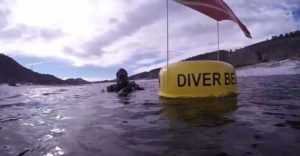February Horsetooth Dive: Gear
Snow on the ground, a thin layer of ice burning off the sunny side of the lake. It's a great day for the February Horsetooth dive.
 Dive Gear
Dive Gear
- Drysuit, check.
- Cold water undergarment, check.
- Properly functioning BC, check.
- 7mm hood, check.
- 5-7mm gloves, check.
- Weights, check.
- Balanced 1st stage regulator, check.
- Balanced 2nd stage regulator, check.
- Balanced auxiliary regulator, uhh...
- Balanced tertiary regulator, check.
- Mammalian reflex checked. Ow, it burns.
When Things Start Going Wrong...
Problem 1: Iced Regulator
As we talked about in the January video, there are a few risks associated with cold water diving. Like, icing regulators. If it happens, there is a process where the diver can decide to thaw the regulator and continue to dive, or call the dive and prevent any opportunity for risk. In this case, the diver went to ~10' and discovered an increase of flow from the regulator. They called the dive.
The slight free-flow at depth increased to full free-flow (even upon ascent) and burned through 2000 psi in under a minute. In this case, calling the dive was the correct thing to do. The diver brought the gear into a certified shop to have the regulator serviced. No problem, no incident, great choice.
We still let them join us for a post-dive breakfast afterwards, even without shunning. After all, in the diving community, there still is honor among thieves.
Problem 2: Weight Management
Proper weighting is imperative. Dry suit diving makes buoyancy a little more challenging with the extra piece of equipment. With the colder water, extra insulation is required. On the same dive, one extra garment caused another diver to desire 2 more lbs of weight. The diver could submerge, but to stay at depth and reduce the squeeze, the additional air required to stay down made buoyancy management uncomfortable. 2 more lbs increased the pleasure and comfort of the dive.
Was it worth calling the dive? No. A little bit of swimming back to shore for extra weight was inconvenient, but made the dive safer and more fun. No problem, no incident, great choice.
Planning Ahead
Diving in cold or warm water requires a bit of planning. On this day, extra weight was brought down to the shore in the event of a weight issue. It didn't save a life, but it did make the day and the dive a little more fun. We also had a dive plan, a lost buddy plan, a "call the dive at any time, for any reason" policy, and all was established ahead of time. Although everything didn't go as planned, our dive plan included a plan for the unplanned. All worked out well.
So What Did We Learn, Kiddies?
- Check your gear
- Plan, communicate, execute
- Get your dive gear serviced
- Expect the unexpected
- Stay calm and dive on
- The Farmer's Hash at the Egg and I is remarkably delicious
